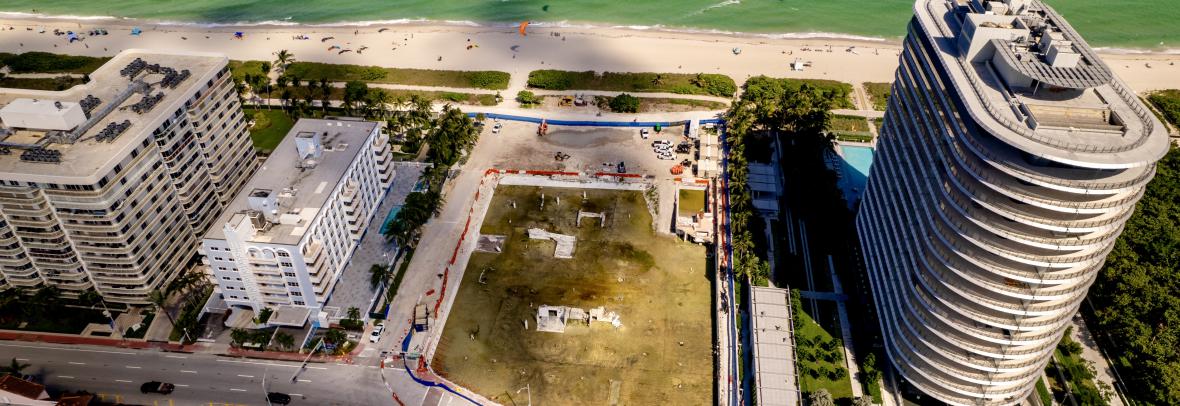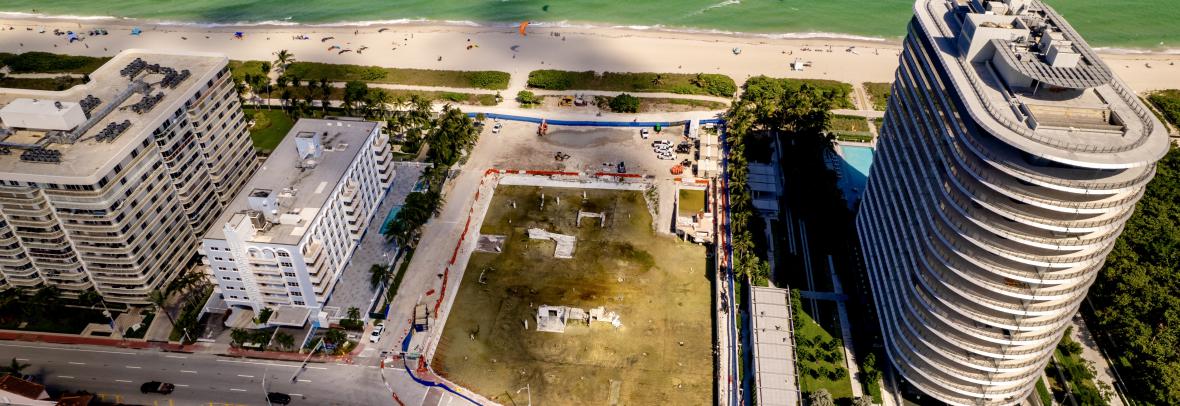
Some fixed-income condo residents in older buildings must pay for expensive deferred-maintenance repairs as they watch their property insurance costs rise.
FORT LAUDERDALE, Fla. – The one-two punch of the post-Surfside law designed to require condominium associations to set aside sufficient reserves for structural repairs combined with Florida’s unending increases in insurance costs is threatening to produce a wave of foreclosures.
“People are going to be losing their homes. Foreclosures are increasing,” warned Broward County Commissioner Mark Bogen. “As it looks right now, there are going to be so many people unable to live in their homes.”
The concerns are coming from across Broward County.
Bogen represents northern Broward, including Wynmoor Village, the large condominium community in Coconut Creek. And in his non-elected job, as a lawyer, he does a lot of work on condo issues.
“The condos have been hit hard,” said state Rep. Robin Bartleman, who represents southwest Broward. “You can’t walk into Century Village right now without hearing” concerns.
At another condominium, in Miramar, Bartleman said residents have to pay assessments for roof work, more money for higher condominium association insurance, and assessments to increase reserves.
The ultimate result, she predicted: “We’re going to have foreclosures all across this county.”
The elected officials who discussed the issues at two workshops last week aren’t promising comprehensive fixes – especially not fixes that will produce quick, dramatic change.
As far as easing the impact of the reserve requirements on condominiums, state Sen. Jason Pizzo, chair of the Broward Legislative Delegation, was blunt: “There is not going to be a state bailout as it relates to condominiums at all. There won’t be.”
Surfside changed things
For decades, many condominiums didn’t set aside enough money to pay for future long-term maintenance costs, and the consequences were vividly illustrated by the 2021 collapse of the Champlain Towers South in Surfside in which 98 people were killed.
State law was changed in the aftermath of the disaster. “Surfside was certainly a wakeup call,” said state Rep. Chip LaMarca of Lighthouse Point.
The new law potentially means large payments to boost reserve accounts, which are equivalent to rainy-day funds to cover large, expensive repairs, and probable special assessments to fund major structural repairs. It goes into effect in 2025.
Bogen and County Commissioner Steve Geller said they’d like to see some delay in the ramping up of reserves.
Geller said some changes are needed. “But I hope that those changes would not include repeal of the law, because there really is a problem with these condominiums with their structural soundness,” he said.
Associations have often voted to waive setting aside money for reserves, something the new law prohibits for funding for projects related to structural integrity such as the roof, load bearing walls, electrical systems, plumbing, windows and foundations, among other items.
Geller recalled his time representing Hallandale Beach in the state Legislature in the 1980s and 1990s. Some residents didn’t want to pay at the time for problems they hoped would have to be addressed after they were no longer alive.
“I would go to people and say, ‘You know, you need to stop waiving your reserve….’ They would say, ‘young man, young man, I’m 77 years old. I’m not going to worry about what’s going to happen in 10 years. Let my children worry about it because they’ll own the condo then. And the problem is that we had so many people that just kept waiving and waiving and waiving.”
Geller said he’d like to see some extra time. “You can’t go from 40 years of ignoring it (and) say you must be in full compliance in five years. So I think the solution that makes sense is just to stretch out that period,” he said.
But, he added, the deadline to start saving shouldn’t be pushed off. “If you just extend it for five years, they’ll still do nothing until the fifth year.”
LaMarca said “lengthening the glide path” for repairs issues identified in a condominium’s structural reserve study “would be helpful.”
All of Broward’s elected county commissioners and state legislators are Democrats, except for LaMarca. He’s a member of the minority party in Broward and the overwhelming Republican majority that controls the state Legislature.
Other fixes
Several other steps were advocated by legislators and commissioners.
LaMarca said he expects more money to be devoted to the My Safe Florida Home program, through which the state pays for inspections and subsidies homeowners making upgrades to make them more resilient to storms. Previous funding has already been obligated, LaMarca said.
“We do need to, in my mind, put some more resources there,” he said.
Pizzo, who represents eastern Broward and northeastern Miami-Dade counties, said condominiums should be allowed to invest reserves instead of keeping them in no-interest accounts. And he said more financing options could be explored for financing structural upgrades.
Insurance
Geller and several other elected officials said they are hearing even more about the impact of ever-increasing insurance costs.
County Commissioner Hazelle Rogers said some are struggling to pay their premiums. She said some older residents who own their own homes outright after having paid off their mortgages are opting against carrying insurance.
State Rep. Patricia Williams, who represents the north-central part of the county, said she, too, is hearing mostly about insurance.
“I get emails after emails every day,” citing one mother of five who said she did not know what she would do after receiving a bill for a 300% premium increase. “At this point, all I can say is we’re working on it.”
The insurance industry and the Legislature have asserted that excessive litigation in Florida is a major factor in driving up insurance premiums. The Legislature responded by restricting people’s rights to sue their insurance companies, but it’s unclear if that will result in any reduction in the rapid increases in premiums.
Pizzo said is unlikely. He said Citizen Insurance Co., the state-backed insurer of last resort, has 1.4 million policies, and 22,000 open litigation cases, which is about 1.7%. He said the notion that litigation is driving insurance premiums is part of a narrative that is “just proving not to be true.”
Combined effects and fixed incomes
Bartleman said the higher condominium costs coming as insurance prices are going up is squeezing many people, especially older people on fixed incomes. Many, she said, can’t afford an extra $100 or $200 a month.
“If you didn’t have the (cost of the reserve) that would be fine. But now put the insurance crisis on top of that and then put having to replace your roofs because you can’t get insurance without replacing our roofs, it’s crippling and we’re going to have foreclosures all over this county.”
The complications could have a ripple effect for the broader South Florida economy, Deerfield Beach Commissioner Tood Drosky, president of the Broward League of Cities, said in a separate workshop with state lawmakers.
“I’ve had residents that have moved to Deerfield Beach from outside the state and they love it here. And they say ‘I didn’t realize it was going to go up so fast and I’m almost regretting coming to Florida,” Drosky said.
“I don’t want that to happen, but we’re going to price out those that have moved here and made Florida their home and the middle class that has been here that we’re going to somehow going to squeeze out and move to other parts of the state.”
State Rep. Daryl Campbell, who represents a central Broward district that straddles Interstate 95, said the outcome for others is potentially even worse. As housing and insurance costs escalate, he said some people are losing their homes and have no place to go.
Campbell said “homelessness is not looking like how we typically would have it in our mind, where you’re panhandling on the side of the road. Homelessness is looking like five, 10 cars outside of one home or apartment complex or couch surfing or even people sleeping in their cars in Walmart parking lot.”
© 2023 South Florida Sun-Sentinel. Visit sun-sentinel.com. Distributed by Tribune Content Agency, LLC. Information from Sun Sentinel archives was used in this report.
Go to Source
Author: kerrys



